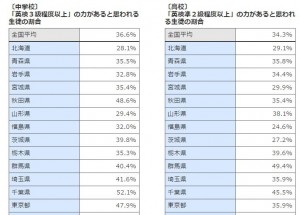Japanese High School Students’ English
Unsurprisingly similar to junior high school students’ English
Following on from the report on Japanese junior high school student English proficiency, I saw this article today about high school students (also this better article with the percentages for each prefecture in Japanese). Miyagi sadly is below the national average for both junior and senior high school.
I don’t think the results are very surprising.
I do wish they would use better tests to set targets, as in my experience it is possible to pass Eiken with relatively poor English skills if you are lucky or prepare for the test format. I would prefer to see a test with separate scores for skills rather than the catch-all pass/fail STEP Eiken.
Also the root of the problem can be seen here: poor English teacher language proficiency. It is incredible, given how much effort and resources Japan puts into English education, that people with insufficient practical language ability are employed to teach it. It should be a huge priority to encourage and help English teachers in junior and senior high school improve their language skills, and to make practical language proficiency a firm requirement when hiring new English teachers.
And of course, everyone should be doing extensive reading and listening 😉
Not Tokyo, it’s Chiba setting the pace!
It’s interesting that Yamagata is well below the average for JHS but above the average for HS. I can’t imagine that the students themselves get relatively that much better compared to the rest of the country in just three years.
The best high schools in Yamagata are public, but wouldn’t private school students be counted as well? Maybe not….
These results are completely unreliable! Not every student takes the test, so results like legoboy mentions above are bound to happen. One cannot make any legitimate comparisons. Regardless, your points about poor JTE proficiency, and better tests (which would naturally provide more accurate data, ie. separate scores) are spot on.

It doesn’t surprise me that Tokyo leads. I think a lot more international families live there. Okayama is holding onto average. We are the countryside. That is what I have to work with.